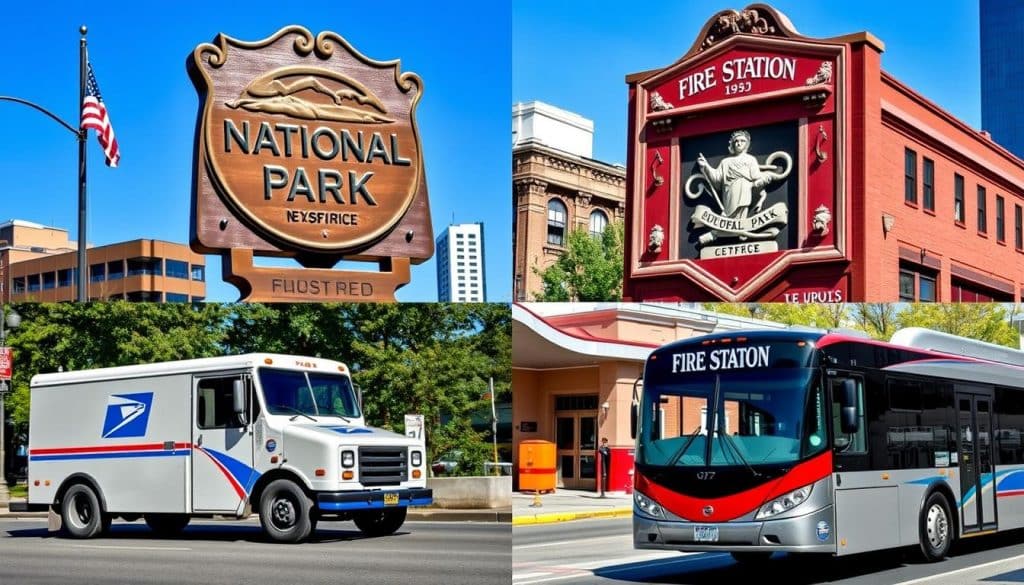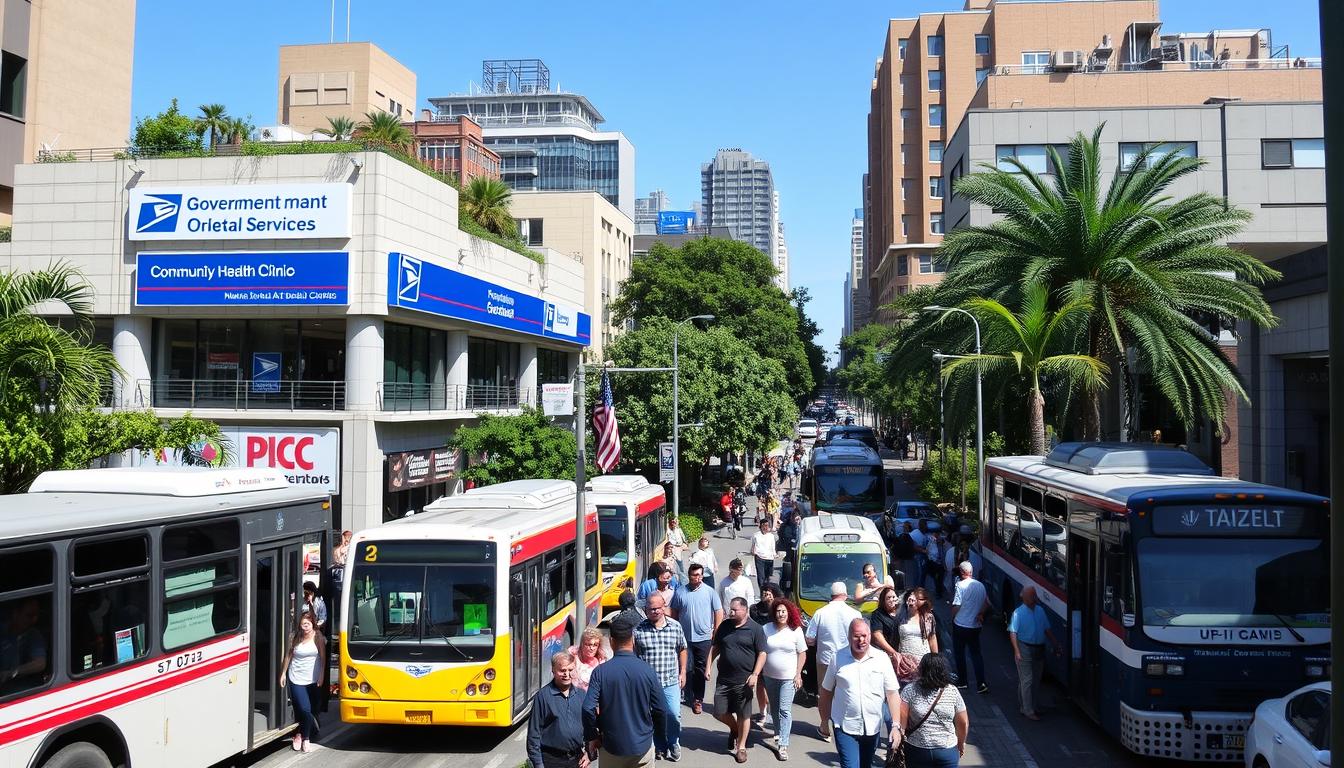Imagine if the future of public services in America depended on how the government works with private companies. The world of government franchises is changing fast. It’s key to understand how government and business work together.
Government franchises are when the public sector gives private groups certain tasks. This way, things can run smoother while the government keeps an eye on things. As the U.S. government looks for franchise opportunities to improve services, it’s important to see how these government franchises are growing.
The line between public and private is blurring, leading to big questions. How will this affect the quality of services, who’s accountable, and if there’s enough competition? It’s important to look at both the good and bad sides of these franchises. This helps everyone involved in government business opportunities.
Key Takeaways
- Government franchises allow for efficient service delivery through public-private partnerships.
- These franchises can significantly enhance public services and generate revenue.
- Stakeholders must be aware of regulatory compliance and competition challenges.
- Understanding transparency and accountability is essential when awarding government franchises.
- The evolution of technology continues to shape the efficiency of government franchises.
- Feedback on franchisor practices, such as control over franchisees, is being sought by the Federal Trade Commission to better regulate these opportunities.
Introduction to Government Franchises
Government franchises are a big deal for public services. They let private companies handle tasks usually done by governments. This municipal franchising system helps businesses offer key services like utilities and transport. It’s all about finding a balance between public control and private efficiency.
By 2022, the US had over 790,492 franchises. They added more than $500 billion to the economy. This shows how important they are.
Definition of Government Franchises
A government franchise is a deal between a government and a private company. It lets the company run public services. These can be things like phone services, water, and trash management.
Governments do this to make services better and more efficient. They want to make sure these services are good for everyone. This way, both sides can work together to meet community needs.
Importance in Public Administration
Government franchises are key in public administration. With more franchises coming, using private companies is seen as a good way to improve services. It can help save money and offer more services without breaking the bank.
But, there are challenges like new businesses failing. Good management can make a big difference. It can lead to better services and happier communities.
Types of Government Franchises
Government franchises are divided into three levels: local, state, and federal. Each level has its own set of opportunities and challenges. They allow for different levels of work between the government and private companies. Knowing about these franchises helps us understand the rules and how they work.
Local Government Franchises
Local franchises cover key community services like waste management and public transport. They help cities improve services and work better with local businesses. These partnerships make operations more efficient and help manage infrastructure.
State Government Franchises
State franchises deal with big projects like building highways and regional transport systems. They use private money to handle big tasks. This helps states grow and makes services and the economy better.
Federal Government Franchises
Federal franchises handle big tasks like mail services and defense logistics. They follow strict rules to ensure accountability and growth. Working with federal agencies gives private companies a chance to help with important national services.
Benefits of Government Franchises
Government franchises bring many benefits to both the economy and public welfare. They help generate revenue, create jobs, and improve public services. This makes them very valuable.
Revenue Generation
One key advantage of government franchises is their ability to make money. They collect fees and taxes, which helps fund public programs. This is good for the economy.
Small businesses get a big share of government contracts. The U.S. government spends over $600 billion on contracts each year. This creates many chances for economic growth.
Job Creation
Government franchises also help create jobs. They work with small businesses, which boosts employment in local areas. This is good for the community.
Government contracts often require working with smaller companies. This helps create a diverse workforce. Programs like the Small Business Innovation Research (SBIR) Program help small firms innovate. This leads to more job opportunities in public services.
Enhanced Public Services
Government franchises also improve public services. Private companies bring new ideas and technology to the table. This makes services more efficient and community engagement better.
By working together, government franchises raise the quality of services. This ensures public needs are met well. Citizens benefit from these partnerships, which focus on their needs and improve local government functions.
Challenges Faced by Government Franchises
Government franchises face many challenges that make their work hard. One big problem is following all the rules. They have to deal with lots of state and federal laws. If they don’t follow these rules, they might get in trouble.
Regulatory Compliance
Keeping up with all the rules is a big worry for government franchises. If they don’t meet the standards, they could face penalties. This makes it even harder for them to do their job well.
Competition with Private Sector
Another challenge is the competition from private companies. These companies often come up with new ideas and work faster. This makes it tough for government franchises to keep up and offer good services.
Funding Limitations
Getting enough money is a big problem for government franchises. They need a good budget to do their work well. But, the government often has to choose between different needs, leaving franchises without enough money.

Criteria for Awarding Government Franchises
Understanding the rules for government franchises is key for those wanting to work with government bodies. You need to show you’re financially stable, have a good track record, and follow the rules. These points help decide if your application is approved.
Eligibility Requirements
Only certain groups like federal agencies and local governments can apply for GSA contracts. They must go through a detailed evaluation after submitting their proposals. This includes showing how they can add value to the public sector. They also need to meet basic standards, like being financially sound and able to operate well.
These standards are outlined in the criteria for government franchises. They make sure applicants are ready to handle the job.
Evaluation Process
The evaluation process checks each proposal carefully. It looks at both the numbers and the quality of the proposal. The aim is to find franchises that offer the best service and are fiscally responsible.
Being open about franchising is very important. It builds trust and ensures fair competition. This openness helps make sure decisions are made with the public’s best interests in mind.
Notable Examples of Government Franchises
Government franchises are key in many areas, like transportation and utilities. They help provide vital services and make operations more efficient. This is thanks to partnerships between public and private sectors.
Transportation Services
Public transit systems often use government franchises to run smoothly. Cities like San Francisco and New York have seen great results. They work with private companies to meet community needs and stay financially stable.
Utility Services
Utility franchises are also important. They deal with water, electricity, and gas. Companies like Pacific Gas and Electric in California have shown success. They work with private partners to keep services reliable and introduce new technologies.
Public Transportation Systems
Public transit systems show the benefits of government franchises. They team up with private operators to improve service and efficiency. For example, the Washington Metropolitan Area Transit Authority has done well. They use franchised services to manage bus routes and make travel easier for everyone.

The Role of Technology in Government Franchises
Technology is key in changing government franchises. It brings new digital solutions for services. These changes make things run smoother, improve how services are managed, and help public services work better.
Government agencies are using new tools and ways to help their communities. This is a big step forward.
Digital Solutions for Service Delivery
In 2023, the ITVMO started a big project. They made one set of rules for using Microsoft products and services in government. This made it easier for agencies to buy what they need.
They looked at over 150 contract terms to make them all the same. This showed how different things were before. Now, agencies have a clear guide for buying.
Impact on Efficiency and Transparency
The GMAS project with Microsoft made contracts more consistent and clear. It also helped solve big problems and talked about important security issues.
Using Low Earth Orbit (LEO) satellites has also made things better. Agencies say they can respond faster and work better in remote areas. This makes people happier with the services they get.
Citizens want government services to be as good as top tech companies. So, there’s a big push to keep investing in technology for government franchises.
Case Studies of Successful Government Franchises
Exploring successful government franchises shows how public and private sectors work together. These partnerships lead to better services, like waste management and public Wi-Fi. Real examples reveal the benefits and challenges of these franchises.
Example 1: Waste Management
Waste management is a key area where government franchises succeed. Many cities have teamed up with private companies to boost recycling and improve waste handling. These partnerships show how private expertise can make waste management more efficient.
By working together, cities have seen more recycling and less waste in landfills. This is a model others can follow.
Example 2: Public Wi-Fi Initiatives
Public Wi-Fi projects are another success story for government franchises. Cities across the U.S. have set up free internet for everyone. This is done by teaming up with tech companies.
These projects make it easier for people to access online services. They also make cities more livable. This shows how franchises can help society grow through technology.
Future Trends in Government Franchises
The world of government franchises is changing fast. One big trend is the rise of public-private partnerships. These partnerships help governments solve big problems by using private sector ideas and skills.
They aim to make services better and projects more successful. This way, both government and private companies work together.
Increasing Use of Public-Private Partnerships
Public-private partnerships are key to making things better. They help governments work smarter and be more resilient. This teamwork can make things ten times better.
By using technology and focusing on people, these partnerships improve how services are delivered. They also make it easier to make and enforce policies.
Sustainability Focus in Franchises
Sustainability is a big deal in government franchises now. Governments are focusing more on green practices in their buying. This means they look for eco-friendly options when they buy things.
As the need to protect the environment grows, companies in areas like energy and building are showing off their green solutions. This makes sure they meet the demand for being sustainable.
Conclusion and Recommendations
Government franchises are key in the U.S. for public services and economic growth. They create thousands of jobs directly and indirectly. They also boost local economies through spending and taxes, helping fund public services and infrastructure.
To improve government franchises, we should work better with the private sector. This can bring new ideas and reach more people. Using technology can make services more efficient and open. Also, focusing on sustainability helps meet the needs of all communities and supports local development.
It’s important to have strong rules for government franchises. These rules should encourage partnerships, openness, and responsibility. By meeting the changing needs of people, franchises can make communities stronger and more prosperous.





